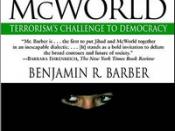In modern society, there are two distinct scenarios for the near future of how the world will act, think, speak, and do. The conflict of religious and ethnic isolation has always fought against the completely commercialistic world. As the advertising of the mercantilism increases, the chances for ethnic tradition to stand strong, fade back. While ideally these two sketches are at war, they are also in fact turning the democratic world into a dark and hazy place. The possibility of complete isolationism by ethnicity's and religions is possible, however the realistic view of the near future is a commercialistic world lined with advertising and impersonal materialism.
I need that new CD..." , "I have to go get new shoes...". These sorts of sayings are not unfamiliar to most of us. We have all at sometime or another wanted something that was not really a necessity to our well being. In the modern world, we are consumers.
And the US is the epitome of consumerism.
The base of consumerism is what Barber terms "soft goods" and service industries. Before this, though, was an economic system based on the production and sale of hard goods. Defense-related goods and industrial production was at the basis of US economics. However, looking back over a number of years (especially with the end of the Cold War), we can see the shift towards the consumerism/soft goods economy. Entertainment and information are at the foundation of this economy, and this is what makes up Barber's McWorld.
He gives numerous examples of the capitalistic US dominance permeating throughout the world. For example, Michael Jordan T-shirts are worn by starving children in Africa, or two-thirds of films shown in Germany are from the US. He also discusses the use of resources by the industrialized countries, focusing his...



Well written
great organization of ideas and good anaylisis. though the conclusion could be stronger and wrap up a bit better. very nice.
4 out of 4 people found this comment useful.